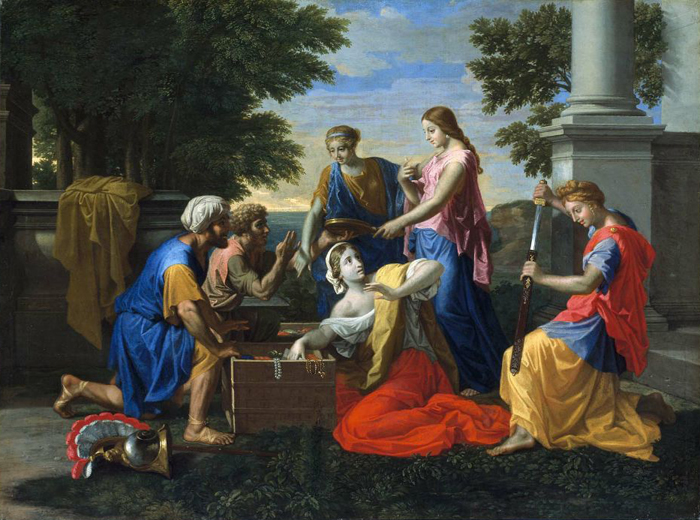Biblical and mythological stories have been retold countless times, and for many of us, we have heard these stories repeatedly throughout our lives. Have you ever read the original story?
“Stories in Art: Sources of Stories” is a chart of biblical and mythological stories with links to the original text, such as the Bible, or an ancient source, such as Homer or Ovid. It also includes a brief synopsis of the story, as well as my favorite depiction of each story.
Stories from the Old Testament | Stories from the Life of Christ | Stories from the Lives of Saints | Stories from Greek/Roman Mythology | Stories from the Trojan War
| Story: | The quick version: | Source: | Image: | Category: |
|---|---|---|---|---|
Stories from the Old Testament: | top of page |
|||
Adam and Eve | Adam and Eve were created by God, and then they were expelled from the Garden of Eden when Eve was tempted by the serpent to eat the fruit from the forbidden tree. | Genesis 2 |  | Old Testament |
Cain and Abel | God favored Abel over his brother Cain, and Cain killed Abel. | Genesis 4 |  | Old Testament |
Noah | God instructed Noah to build an ark in order to save him from the flood. | Genesis 6-9 |  | Old Testament |
Lot and his Daughters | Lot (Abraham's nephew) and his daughters were saved from the destruction of Sodom and Gomorrah. Thinking that the world had been destroyed and that they must re-populate it, Lot's eldest daughter conspired with the younger to make their father drunk, so that they could lie with him without his knowledge. | Genesis 19 |  | Old Testament |
Hagar and Ishmael | When Abraham's wife Sarah her son Isaac playing with Abraham's other son Ishmael, she insists that Abraham send Ishmael and his mother Hagar away. | Genesis 21 | 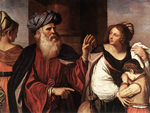 | Old Testament |
Abraham and Isaac | God tested Abraham by commanding him to sacrifice his son Isaac. Abraham bound Isaac, prepared the sacrifice and raised his sword, but at the last moment, his hand was stopped by an angel of God who pointed to a ram to be sacrificed instead of Isaac. | Genesis 22 |  | Old Testament |
Rebekah | Rebekah was chosen by Abraham's servant Eliezer as a wife for Abraham's son Isaac because she showed kindness and generosity to Eliezer at a well. | Genesis 24 |  | Old Testament |
Isaac Blessing Jacob | Rebekah helped her son Jacob to trick his father Isaac in to giving him the blessing of the firstborn son, which was reserved for his elder twin brother Esau. | Genesis 27 |  | Old Testament |
Jacob's Dream | On a journey, Jacob has a dream about a stairway (or ladder) to heaven, with angels ascending and descending. God speaks to him in his dream, and tells him that he will be given the land he is sleeping on, that his descendents will be too many to count, and that he is always watching over Jacob. | Genesis 28 | 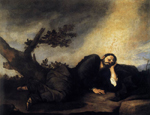 | Old Testament |
Joseph | Joseph, the favored son of Jacob, was cast out by his jealous brothers and sold to Egyptian slave-traders. He was sold to Potiphar, and after being falsely accused by Potiphar's wife, he was thrown in prison where he interpreted dreams. Years later, after being given the chance to interpret the pharoah's dreams, Joseph became a trusted advisor to the pharoah and advised him on how to prepare for the coming famine. Many years later, Joseph was reunited with his brothers when they went to Egypt for food during the famine. | Genesis 37-50 |  | Old Testament |
Joseph and Potiphar's Wife | After Joseph's brothers sold him to Egyptian slave-traders, he became a slave to Potiphar, an advisor to the Pharoah. When Joseph refused the overt advances of Potiphar's wife, she falsely accused Joseph of seducing her, and Joseph was thrown into jail. | Genesis 39 |  | Old Testament |
Joseph Reunited with his Brothers | After many years apart, Joseph was reunited with his brothers and his father Jacob when they needed food during the famine. Ten of Joseph's brothers went to Egypt and met Joseph but did not recognize him. Joseph insisted that they return with their youngest brother Benjamin. Joseph hid his silver cup in Benjamin's sack, then accused him of stealing it. When his brothers pleaded with Joseph to spare Benjamin for the sake of their father, he revealed himself to them and insisted that they bring Jacob to Egypt. | Genesis 42-46 |  | Old Testament |
The Finding of Moses | When the pharoah decreed that the first-born child of every Hebrew was to be killed, Moses' mother placed her infant son in a basket and set the basket in the river. The pharoah's daughter found the basket and decided to keep the baby. The pharoah's daughter hired Moses' mother to be a nurse for Moses, and she instructed him in the ways of the Hebrews. | Exodus 2 |  | Old Testament |
Jael and Sisera | In the days when the prophet Deborah ruled Israel, the Israelites were treated poorly by the Canaanite king Jabin, whose army was commanded by Sisera. Deborah set a trap to lure Sisera to Mount Tabor, where Deborah's commander Barak was waiting with an army. As Barak's men attacked Sisera's army, Sisera fled on foot. He ran towards the tent of Heber, whose family was known to be friendly with Jabin. Heber's wife Jael greeted Sisera as he approached, and welcomed him in their tent. Then, as he slept, Jael drove a tent peg into Sisera's temple. The Israelites were no longer mistreated by Jabin's men after that day. | Judges 4 |  | Old Testament |
Samson and Delilah | Samson ruled Israel, and repeatedly defeated the Philistines due to his incredible strength. He fell in love with Delilah, and the Philistines asked her to find out the source of Samson's strength. Samson told Delilah that an angel had instructed his mother never to cut his hair. Delilah betrayed Samson by cutting his hair while he slept, and the Philistines defeated Samson. | Judges 16 |  | Old Testament |
David and Goliath | As a young shepherd, David defeated the enemy Goliath by pelting him with a stone, then decapitating him with Goliath's sword. | 1 Samuel 17 |  | Old Testament |
David and Bathsheba | King David spied on Bathsheba from his roof while she bathed. He summoned her, and when she became pregnant, David arranged to have her husband killed in battle. Bathsheba became David's wife, and the mother of Solomon. | 2 Samuel 11 |  | Old Testament |
Judgment of Solomon | King Solomon settled a dispute between two mothers. The two women each had an infant, and one mother accused the other of having switched the two babies after she inadvertently killed her own baby. Both women insisted they were mother of same baby, and so King Solomon decided that the baby should be cut in two so both woman could have half. The rightful mother then insisted that the baby be given to the other mother, while the other woman agreed with King Solom's decree. King Solomon wisely recognized the rightful mother, who have would rather give the child away than see him killed. | 1 Kings 3:16 |  | Old Testament |
Solomon and Sheba | Upon hearing of King Solomon's great wealth and wisdom, the queen of Sheba travelled to Jerusalem with a large caravan of riches. King Solomon proved to be even wiser and more prosperous than she had heard, and she was overwhelmed by everything she saw at King Solomon's palace. The queen of Sheba gave King Solomon a generous gift of spices, gold and precious stones, and King Solomon gave the queen of Sheba "everything she desired and asked for." | 1 Kings 10 and 2 Chronicles 9 |  | Old Testament |
Esther Before Ahasuerus | During the reign of King Ahasuerus of Persia (Xerxes I, 486 - 465 BCE), a Jewish woman named Esther became the queen of Persia. During this time, the king elevated Haman to a high position in the kingdom, and everyone but Mordecai (Esther's cousin) bowed to Haman. Haman was enraged by this, and when he discovered that Mordecai was Jewish, he convinced King Ahasuerus to kill all of the Jews in Persia. Mordecai sent word to Esther about the plot, and asked her to plead with the king for mercy. No one was permitted to approach the king without having been summoned, but Esther prayed to God and fasted for three days, then risked her life by breaking this rule. She approached the king, but he was enraged by this breach of etiquette, and Esther fainted in fear. God softened the kings heart, and he rose from his throne to assist his wife. When she came to, he offered to grant her any wish, and Esther asked that the king and Haman join her for dinner. At dinner, Esther told the king that Haman wanted to kill her and all of her people. King Ahasuerus had Haman put to death, and the Jews were spared. | Esther 5 (Apocrypha) |  | Old Testament |
Susanna and the Elders | Susanna was bathing privately while two elders were spying on her. When they propositioned her and she refused, they falsely claimed that she committed adultery. When Susanna was sentenced to death for her crime, Daniel insisted that the matter was investigated by questioning the elders separately. When he found that their stories didn't match, Susanna was vindicated. | Daniel 13 |  | Old Testament |
Judith and Holofernes | Judith saved her people by pretending to betray them and befriending the enemy Holofernes. She gained his trust, encouraged him to drink, and decapitated him with his sword. | The Book of Judith |  | Old Testament |
Stories from the Life of Christ: | top of page |
|||
The Meeting of Joachim and Anna | Joachim and Anna (the parents of the Virgin Mary) met at the gates of Jerusalem after they were each visited separately by an angel. The angel told each of them that they would have a daughter, and their daughter would become the mother of Jesus Christ. The angel sent them to meet eachother at the gate, and then they conceived their daughter Mary. | The Golden Legend, vol. 5 |  | Life of Christ |
Immaculate Conception | Immaculate Conception refers to the conception of the Virgin Mary, who was free from original sin from the moment she was conceived in Anna's womb. During the Baroque era, it became common to illustrate this concept by depicting Mary as a young girl wearing white or blue, with a devout demeanor and either a halo of stars, or a crescent moon at her feet. | Ineffabilis Deus, Apostolic Constitution of Pope Pius IX on the Immaculate Conception (December 8, 1854) | Invalid shortcode | Life of Christ |
The Betrothal of Joseph and Mary | Joseph was chosen among the descendants of David to be betrothed to the Virgin Mary. It was foretold that all bachelors of the House of David should bring a rod to the altar, and he whose rod flourished should be married to the Virgin Mary. Joseph became engaged to Mary when he brought his rod to the altar and it flowered. | The Golden Legend, vol. 5 |  | Life of Christ |
The Annunciation | While Mary was betrothed to Joseph, the angel Gabriel visited her in Nazareth and told her that she would conceive a son who would be called the Son of God. | Luke 1:26 | Invalid shortcode | Life of Christ |
The Visitation | Mary (mother of Christ) visited Elizabeth (mother of John the Baptist) during their pregnancies, and Elizabeth's baby leapt within her womb at the sound of Mary's voice. | Luke 1:39 | Invalid shortcode | Life of Christ |
The Birth of Christ | Jesus Christ was born to the Virgin Mary while she and her fiance Joseph were on a journey from Nazareth to Bethlehem in order to be counted in the census. An angel of the Lord told nearby shepherds that the Messiah had been born, and that he would be found wrapped in cloths in a manger. The shepherds visited the Holy Family in the manger, and then spread the word of the birth of the Messiah. | Matthew 2 Luke 2 | Invalid shortcode | Life of Christ |
The Adoration of the Magi | Three magi from the east came to Jerusalem asking for "the one who has been born king of the Jews" so that they could worship him. They saw his star, and followed it until it stopped over a house where they found the infant with his mother. They gave the infant Christ gifts of gold, frankincense and myrrh. | Matthew 2 | Invalid shortcode | Life of Christ |
The Flight in to Egypt | An angel of the Lord appeared to Joseph in a dream and warned him to escape to Egypt because King Herod was looking for the infant Jesus to kill him. Joseph took Mary and Jesus to Egypt, and they stayed there until the death of King Herod (Matthew 2:13). According to an oral legend, the Holy Family rested during their escape to Egypt, and the infact Christ performed miracles such as causing a tree to bend down so that Joseph could reach the fruit. | Matthew 2:13 oral legend | Invalid shortcode | Life of Christ |
Christ in the Temple | When Jesus was twelve and his family travelled to Jerusalem for Passover, he stayed behind after his family departed. When they returned to look for him, they found him in the temple listening to the teachers and asking them questions. Those who heard him were amazed at his understanding. | Luke 2:41 | Invalid shortcode | Life of Christ |
John the Baptist in the Wilderness | John the Baptist travelled in the wilderness of Judea, preaching that sins would be forgiven for those who were baptized. Many came to him, and he baptized them in the River Jordan. John the Baptist foretold the coming of the Messiah. | Matthew 3 Mark 1:4 Luke 3 John 1:19 | Invalid shortcode | Life of Christ |
The Baptism of Christ | John the Baptist was preaching that sins would be forgiven for those who repented by baptism. Jesus was among those baptized by John the Baptist. | Matthew 3:13 Mark 1:9 Luke 3:21 | Invalid shortcode | Life of Christ |
The Sermon on the Mount | The Sermon on the Mount is the beginning of Jesus's teachings in the Gospel of Matthew. As he began to teach and gather followers, he went up a mountainside, sat down before a crowd of followers and spoke at length. In his sermon, Jesus began with the beautitudes, then discussed laws, compassion, charity, prayer and wisdom. | Matthew 5 | Invalid shortcode | Life of Christ |
The Calling of St. Matthew | Jesus saw a man named Matthew (or Levi) sitting at the tax collector's booth. He said 'Follow me,' and Matthew followed him. | Matthew 9:9 Mark 2:13 Luke 5:27 | Invalid shortcode | Life of Christ |
Calling of the Apostles | Jesus called upon twelve men to be his disciples: two brothers, Peter and Andrew (Matthew 4:18, John 1:40), the sons of Zebedee, James and John, (Matthew 4:21), Matthew (Matthew 9:9), Philip, Bartholomew, Thomas, James son of Alphaeus, Thaddaeus, Simon the Zealot, and Judas Iscariot (Matthew 10:2, Mark 3:13, Luke 6:12). | Matthew 10:2 Mark 3:13 Luke 6:12 | Invalid shortcode | Life of Christ |
The Wedding at Cana | Jesus attended a wedding at Cana in Galilee along with his mother and his disciples. His mother pointed out that there was no more wine, and then she instructed the servants to do as Jesus said. Jesus instructed the servants to fill six jars with water, and then serve it to the master of the banquet. Jesus turned the water to wine, and the master commented to the groom that it was best of wines. This was the first of the signs through which he revealed his glory. | John 2 | Invalid shortcode | Life of Christ |
The Storm on the Sea of Galilee | Jesus and his disciples were in a boat on the Sea of Galilee when a raging storm began to throw waves into their boat. The disciples were terrified, but Jesus asked them why they were so afraid. He rebuked the wind and the waves, and then the sea was calm. His disciples marvelled that even the wind and the sea obeys him. | Matthew 8:23 Luke 8:22 | Invalid shortcode | Life of Christ |
The Beheading of John the Baptist | Herod had John the Baptist arrested because John denounced Herod's marriage to Herodias, his brother's former wife. Herodias wanted to have John the Baptist killed, but Herod would not allow it because John had become popular among the people. At a feast, Herodias's daughter Salome danced for the guests, and Herod promised to give her whatever she asked for. At her mother's prompting, Salome asked for the head of John the Baptist. John was beheaded in prison, and his head was brought to Salome on a platter. | Matthew 14 Mark 6:17 | Invalid shortcode | Life of Christ |
Christ Giving the Keys to Peter | After Peter acknowledged that Jesus was the son of the living God, Jesus said to Peter, " On this rock I will build my church. The gates of hell will not be strong enough to destroy it. I will give you the keys to the kingdom of heaven. What you lock on earth will be locked in heaven. What you unlock on earth will be unlocked in heaven." | Matthew 16:17 | Invalid shortcode | Life of Christ |
The Transfiguration | Jesus travelled up a mountain with Peter, James and John (the brother of James), and they saw him transfigured: "His face shone like the sun, and his clothes became as white as the light" (Matthew 17.2). Then, Moses and Elijah appeared and conversed with Jesus, and then the disciples heard the voice of God. They fell facedown, and when Jesus helped them up, they saw no one other than Jesus. | Matthew 17:1 Mark 9:2 Luke 9:28 | Invalid shortcode | Life of Christ |
The Last Supper | Christ shared a final meal with his disciples, and he instructed them to eat the bread that is his body, and the wine that is his blood. He also announced that one of his disciples would betray him. | Matthew 26:17 Mark 14:12 Luke 22:7 | Invalid shortcode | Life of Christ |
The Kiss of Judas | The chief priests were looking for a way to get rid of Jesus, and Jesus' disciple Judas betrayed him by agreeing to hand him over. Judas brought a crowd with him to Gethsemane, where Jesus had gone to pray. According to a pre-arranged signal, Judas identified Jesus to the soldiers by greeting him with a kiss. The men arrested Jesus and took him to Caiaphas, the high priest. | Matthew 26:47 Mark 14:43 Luke 22:47 | Invalid shortcode | Life of Christ |
The Crucifixion of Christ | Pontius Pilate sentenced Jesus Christ to death by crucifixion. Simon of Cyrene was forced to carry Jesus' cross to Golgotha, where Jesus was nailed to the cross and crucified along with two thiefs. On Jesus' cross was the charge against him: "Jesus of Nazareth, King of the Jews." As he died, the crowd shouted insults at him while a group of women, including the Virgin Mary and Mary Magdalene, watched from a distance. | Matthew 27:32 Mark 15:21 Luke 23:26 John 19:16 | Invalid shortcode | Life of Christ |
The Deposition from the Cross | Joseph of Arimathea, a disciple of Jesus, asked Pilate for Jesus' body. Joseph took Jesus' body down from the cross, wrapped it in clean linen and placed it in a tomb. The women who accompanied Jesus to Golgotha, including the Virgin Mary and Mary Magdalene, were there as well. | Matthew 27:57 Mark 15:42 Luke 23:50 John 19:38 | Invalid shortcode | Life of Christ |
The Pietà | In a scene that is not described in the New Testament, the Virgin Mary mourns over the body of her son after he is taken down from the cross. This scene became known as 'pietà' which simply means 'pity' in Italian. | Invalid shortcode | Life of Christ | |
The Resurrection of Christ | Jesus was buried on the day before the Sabbath, and on the day after the Sabbath, the Virgin Mary and Mary Magdalene went to visit his tomb. An angel of the Lord appeared to them and told them that Jesus was not there, that he had risen from the dead and gone ahead of them to Galilee. The angel told the women to go and tell the disciples, and while they were on their way, they saw Jesus. He greeted them, told them not to be afraid, and told them to tell his brothers. | Matthew 28 Mark 16 Luke 24 John 20 | Invalid shortcode | Life of Christ |
The Supper at Emmaus | Jesus appeared to his disciples after his resurrection, and he joined then for dinner in Emmaus. They were kept from recognizing him until after the meal had begun. Once their eyes were opened, they ran to tell the eleven apostles, and then Jesus appeared to them as well. | Luke 24:13 | Invalid shortcode | Life of Christ |
The Ascension of Christ | Jesus ascended to heaven after his death and resurrection. | Luke 24:50 | Invalid shortcode | Life of Christ |
The Death and Assumption of the Virgin | The Virgin Mary gathered all of the apostles before her death. She was taken up, body and soul, to heaven at the end of her earthly life. | The Golden Legend, vol. 4 | Invalid shortcode | Life of Christ |
Stories from the Lives of Saints: | ||||
The Liberation of St. Peter | King Herod persecuted the followers of Christ, and imprisoned Peter the Apostle. Although he was bound with chains and guarded in prison by soldiers, Peter was liberated from prison by an angel. | Acts 12 | Invalid shortcode | Lives of the Saints |
The Conversion of St. Paul | Originally a staunch enemy of the church, Saul became a follower of Christ when a light from heaven stopped him on his way to Damascus. He fell to the ground, and heard a voice ask Saul, Saul, why do you persecute me? The voice told him to get up, go in to the city, and that he will be told what to do. When Saul got up and opened his eyes, he found that he as blind, and couldn't see for three days. The Lord sent the disciple Ananias to Saul to restore his sight, and Saul began preaching in the synagogues as a devout disciple of Christ. (Saul later becomes known as Paul). | Acts 9 | Invalid shortcode | Lives of the Saints |
St. George and the Dragon | A dragon plagued the town of Silene, and they found that they could avoid its terror if they gave the dragon two sheep each day. When they ran out of sheep, they began drawing lots to feed the people of Silene to the dragon, until it came to the king's daughter's turn to be fed to the dragon. St. George, a knight from Cappadocia, came upon the weeping princess as she awaited her fate, the princess explained about the dragon, and St. George vowed to help her in the name of Jesus Christ. St. George wounded the dragon, brought it back to Silene, and told the people of Silene that he would slay the dragon if they converted to Christianity. The entire town converted, and St. George killed the dragon. | The Golden Legend, vol. 3 | Invalid shortcode | Lives of the Saints |
Stories from Greek/Roman Mythology: | top of page |
|||
Aphrodite and Ares | Helios saw Aphrodite and Ares having a love affair at the home of Hephaestus, husband of Aphrodite, and Helios told Hephaestus who devised a plan. When they thought Hephaestus was away, Aphrodite and Ares met at his house, and they became trapped in an intricate net that Hephaestus had crafted to trap them. Once caught, Hephaestus called on all of the other gods and goddess to witness his wife's betrayal. In The Odyssey, this story is retold over a campfire. | Homer's The Odyssey: Book 8:256, Ovid's Metamorphoses: Book 4:167 |  | Greek mythology |
Apollo and Daphne | Having been struck by Cupid's arrow, Apollo lusted after Daphne, who had been struck by an arrow with the opposite effect. She ran as Apollo pursued her, and called out to her father, a river god, to save her. Daphne's father turned her in to laurel tree just as Apollo caught up with her. Apollo could still feel her heart beating although her skin had begun to turn to bark and her fingers sprouted leaves. | Ovid's Metamorphoses: Book 1:473 |  | Greek mythology |
Daedalus and Icarus | Icarus and his father Daedalus, the master craftsman and creator of the labyrinth, attempted to escape from Crete using wings that Daedalus had created with feathers and wax. Daedalus told Icarus not to fly too close to the sun, but Icarus ignored the warning and did exactly that. The wax in his wings melted, and he fell to his death. | Ovid's Metamorphoses: Book 8:183, Pseudo-Apollodorus' Bibliotheca: E.1.12 | 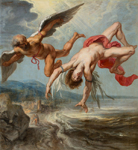 | Greek mythology |
Danaë and the Shower of Gold | Acrisius, King of Argos, consulted an oracle about his lack of a male heir and learned that he would be killed by his daughter's son. His daughter, Danaë, was childless and Acrisius locked her in a tower to keep her that way. Zeus came to Danaë's bed in the form of a shower of gold in order to hide his amorous adventure from his wife. Danaë gave birth to the hero Perseus and Acrisius cast the two into the sea in a wooden chest. | Ovid's Metamorphoses: Book 4, 604, Ovid's Amores: 2.14, Pseudo-Apollodorus' Bibliotheca: 2.4 | 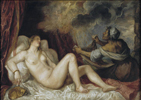 | Greek mythology |
Europa | To attract the attention of Europa, the king's daughter, Zeus transformed himself into a beautiful white bull at the shore where Europa often went with her friends. Europa was intrigued by the beautiful creature, and offered it flowers. When she got too close, Zeus swept her onto his back and swam away with Europa gripping the bull's horn. | Ovid's Metamorphoses: Book 2:833 | 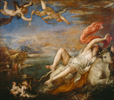 | Greek mythology |
Ganymede | Ganymede was a beautiful Trojan prince, and Zeus swooped him up on an eagle to become the cupbearer to the gods. Ganymede was the son of Tros, who was an ancestor of the Trojan kings including Priam. | Ovid's Metamorphoses: Book 10:143, Pseudo-Apollodorus' Bibliotheca: 3.12.2 |  | Greek mythology |
Hades and Persephone | Persephone, the daughter of Demeter, was abducted by Hades and taken to Tartarus. Demeter begged Zeus to intervene, but since Zeus was the brother of both Demeter and Hades, he decided that Persephone would spend half of the year with her mother and half of the year with Hades. Demeter, the goddess of the harvest, caused crops to be plentiful only when her daughter Persephone was with her. | Pseudo-Apollodorus' Bibliotheca: 1.5.1, Ovid's Metamorphoses: Book 5:385 |  | Greek mythology |
Hercules' Twelve Labors | As penance for killing his wife and children, Hercules performed twelve labors in the service of King Eurystheus. Hercules' Twelve Labors were 1) to bring the skin of the Nemean Lion to Eurystheus, 2) to kill the Lernaean Hydra, 3) to bring the Ceryneian Hind alive to Mycenae, 4) to bring the Erymanthian Boar alive, 5) to clean the Augean Stables in a single day, 6) to chase away the Stymphalian Birds, 7) to bring the Cretan Bull, 8) to bring the Mares of Diomedes the Thracian to Mycenae, 9) to bring the Belt of Hippolyta, the Queen of the Amazons, 10) to fetch the Cattle of Geryon from Erythia, 11) to fetch the Apples of the Hesperides and 12) to bring Cerberus, the three-headed guard dog of Hades. | Pseudo-Apollodorus' Bibliotheca: 2.5 | Invalid shortcode | Greek mythology |
Perseus and Andromeda | Andromeda was the daughter of King Cepheus and Queen Cassiopeia. When her mother boasted that Andromeda was more beautiful that the Nereids (sea nymphs), Zeus sent a sea monster to threaten Cepheus' kingdom. Cepheus offered up Andromeda as a sacrifice to appease the sea monster, and left her chained to a rock. She was rescued by the hero Perseus, who used the head of Medusa to turn the sea monster to stone. Andromeda married Perseus. | Ovid's Metamorphoses: Book 4:663 |  | Greek mythology |
Lucrezia | Lucrezia, the wife of a nobleman, was approached by Sextus Tarquinius, son of the last king of Rome, who gave her an impossible ultimatum. He insisted that Lucrezia sleep with him, and if she refused, he threatened to kill her and one of her male servants, and have it appear as if she were caught in the act of sleeping with her servant. Lucrezia opted to remain alive, but then suffered greatly from the guilt and killed herself. In the wake of her death, the people began a rebellion, overthrew the king, and founded the Roman Republic. | Livy's The Rise of Rome, Book 1:57, Dionysius of Halicarnassus' Roman Antiquities, Book IV | 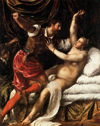 | Roman legend |
Queen Tomyris | Cyrus the Great, King of Persia, sought to marry Queen Tomyris in an effort to conquer her land, and when she refused, and Cyrus the Great attacked her army, headed by her son Spargapises. Upon learning that Spargapises' men were unfamiliar with the effects of wine, he contrived to get them drunk and then attacked. Spargapises was subsequently captured, and then killed himself. In revenge for the deceitful death of her son, Queen Tomyris led her armies to attack Cyrus the Great, and defeated and killed him in 530 BC. She had his decapitated head brought to her, and dipped it in human blood, saying "I live and have conquered you in fight, and yet by you am I ruined, for you took my son with guile; but thus I make good my threat, and give you your fill of blood." | HerodotusThe Histories: I.201 | 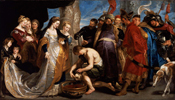 | Ancient history |
Stories from the Trojan War: | top of page |
|||
Leda and the Swan | Zeus came to Leda in the form of a swan on the same evening that she lay with her husband Tyndareus, the King of Sparta. Pollux and Helen are the children of Zeus and Leda, and Castor and Clytemnestra are the children of Tyndareus and Leda. Leda is said to have laid an egg, which hatched Helen, whose abduction triggered the Trojan War. Helen and Clytemnestra married the brothers Menelaus and Agamemnon. | Pseudo-Apollodorus' Bibliotheca: 3.10.7 |  | Trojan War |
The Wedding of Peleus and Thetis | All but one of the gods and goddesses were invited to the wedding of the goddess Thetis and the mortal prince Peleus (the parents of Achilles). Eris, the goddess of strife, arrived uninvited and dropped an apple among the guests. The apple was labeled: To the Fairest. The goddesses Athena, Hera and Aphrodite all claimed that the apple was meant for her, and they asked Zeus to decide. Not wanting to choose among his wife and daughters, Zeus had the Trojan prince Paris decide instead. (See Judgment of Paris). | The Cypria |  | Trojan War |
The Judgment of Paris | The Trojan Prince Paris was asked by Zeus to judge a contest among three goddesses for an apple labeled 'for the fairest.' Hera, Athena and Aphrodite all claimed the apple as her own, and they each tried to bribe Paris for the apple. Hera offered favorable land, Athena offered victory in war, and Aphrodite succeeded in bribing Paris with the love of the most beautiful woman in the world. Paris awarded the apple to Aphrodite, who then led Paris to Helen of Sparta. Paris abducted Helen, which sparked the Trojan War. | Pseudo-Apollodorus' Bibliotheca: E.3.2, Euripides' Trojan Women: 920 |  | Trojan War |
Achilles Among the Daughters of Lycomedes | Thetis dressed Achilles as a girl, and hid him among the daughters of Lycomedes when she heard a prophecy that he would be killed in battle. Odysseus went to Skyros when he heard a prophesy that the Trojan War could not be won without Achilles. Unable to find him among the daughters, Odysseus hid weapons in a chest of jewels. Odysseus recognized Achilles because he was immediately drawn to the weapons while the daughters were drawn to the jewelry. | Pseudo-Apollodorus' Bibliotheca: 3.13.8, Ovid's Metamorphoses: Book 13:123 |  | Trojan War |
The Sacrifice of Polyxena | At the end of the Trojan War, Polyxena, the youngest daughter of the Trojan King Priam and Queen Hecuba, was sacrificed to the ghost of Achilles, which insisted on the sacrifice in order to grant favorable winds for the Greeks' return home. She died bravely, insisting on her freedom rather than being captured as a slave, at the hands of Achilles' son Neoptolemus. Her mother, Hecuba, was devastated by the loss of one of her only remaining children. | Euripides' Hecuba: 342, Ovid's Metamorphoses: Book 13:429 |  | Trojan War |
The Trojan Horse | The Trojan War finally came to an end when the Greeks left a wooden horse just outside the Trojan gate. Thinking it was a gift to indicate the Greeks' surrender, the Trojans brought the horse inside their walls and celebrated the end of the long war. In he middle of the night, Greek soldiers came out of the horse and sacked the city of Troy. In The Odyssey, this story is retold over a campfire. | Homer's The Odyssey: Book 8:469, Virgil's The Aeneid: Book 2 |  | Trojan War |
Aeneas Escapes from Troy | synopsis coming soon | Virgil's The Aeneid: Book 2:624 |  | Trojan War |
The Death of Dido | synopsis coming soon | Virgil's The Aeneid: Book 4:450 | Invalid shortcode | Trojan War |
Penelope | Assuming that Odysseus was dead, several men courted his wife Penelope in order to become the new King of Ithaca. Penelope wisely played along, and promised to choose one of them as soon as she had finished weaving an elaborate shroud for Odysseus' father. Every night, she unravelled her weaving, keeping the suitors at bay for many years while she awaited the return of her husband. | Homer's The Odyssey: Book 2:85 |  | Trojan War |
Odysseus and the Sirens | Circe had warned Odysseus that no man who followed the tempting voices of the Sirens would ever reach home, so he followed her instructions when he approached the island of the Sirens. Odysseus put wax in the ears of his men, and then they tied Odysseus to the mast of the ship. Odysseus was able to hear the Sirens' voices and yet still pass by their island and continue on his way home. | Homer's The Odyssey: Book 12:165 |  | Trojan War |
Odysseus and the Cyclopes | synopsis coming soon | Homer's The Odyssey: Book 9:105, Virgil's The Aeneid: Book 3:588 | Trojan War | |
top of page |
~ Stories from the Old Testament: ~ | Samson and Delilah | The Flight in to Egypt | The Deposition from the Cross | Europa |
Notes on Sources:
In the table above, each story is linked to an internet resource for that text. Here are some links that are used frequently in this table.
- The Bible: The Old and New Testaments, New International Version, published online at biblegateway.com
- The Golden Legend: compiled by Jacobus de Voragine in 1275, translated in to English by William Caxton in 1483, published online by Fordham University
- Bibliotheca, by Pseudo-Apollodorus (a 2nd century AD compilation of a lost work, previously thought to be written by Apollodorus of Alexandria), translated by J. G. Frazer and published online at theoi.com
- Metamorphosis, by Ovid (43 BC – AD 17/18), translated by A. S. Kline, published online at poetryintranslation.com
- The Odyssey, by Homer, translated by A. S. Kline, published online at poetryintranslation.com
- The Aeneid, by Homer, translated by A. S. Kline, published online at poetryintranslation.com
Poetry in Translation has versions of The Iliad, The Odyssey and The Aeneid with line numbers so it’s easy to link to, but I prefer Robert Fagles’ translations of these epic tales. His most recent editions can be found here: The Iliad, The Odyssey and The Aeneid.

